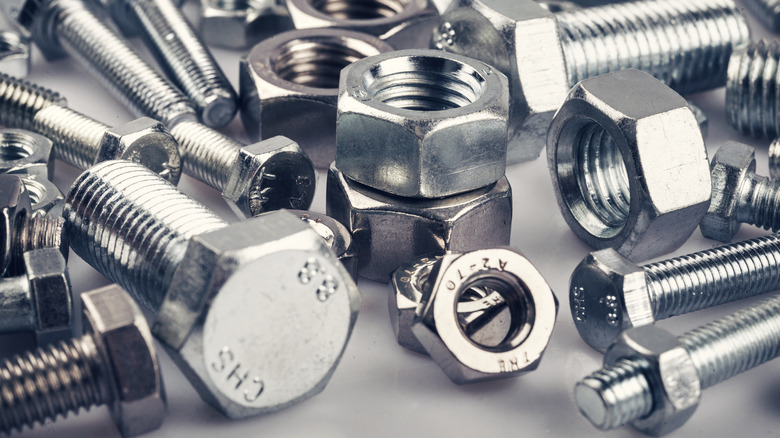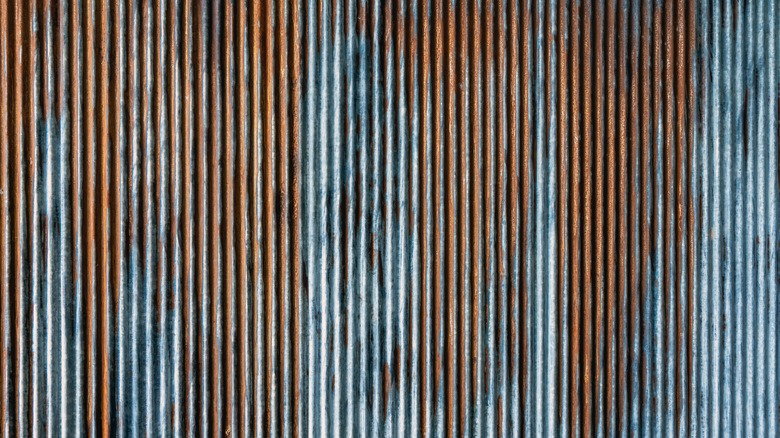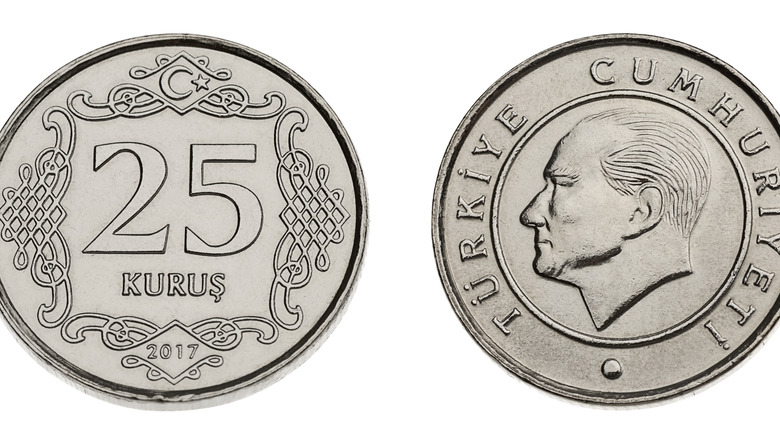The Best Way To Clean Zinc Hardware
Suggestions for cleaning zinc items range from the benign (soap and warm water) to the aggressive (sulfuric acid), but Zincsmith asserts that the best approach involves neither extreme. In fact, less handling is the way to go when cleaning zinc hardware, jewelry, decorative items, or tabletops. Zinc is thought of as living, in that it reacts to whatever it comes into contact with. According to Seattle pi, when zinc is exposed to water, it will oxidize and form a white patina. Exposed to the air, the metal's surface will darken and may eventually even turn black.
This patination process can take a year or two to fully develop, and it gives zinc a distinctive mottled appearance that is considered desirable by many. The oxidation also serves as a protective coating for zinc. Per Home Viable, instead of removing the patina covering, the objective should be to simply clean it. Keep in mind that zinc is not a porous metal, so the areas of discoloration are only skin deep. Spots can be easily removed by mildly cleaning, buffing, or polishing them.
Zinc is a heavy metal, and is used in alloys to protect other metals against rust and corrosion. The word zinc means stone in Persian, and China, Australia, and Peru are major sources for it. Per the Royal Society of Chemistry, the ancient Greeks and Romans were aware of the element. They might also have wondered how best to clean it.
What to do when cleaning zinc
For day-to-day cleaning, all that's needed is a sponge, paper towel, or microfiber cloth, as well as non-acidic dish soap. A sponge's scratchy side is useful for removing areas of oxidation. Cleaning the surface of zinc hardware regularly is a good practice, and it is important to keep it dry. Tips Bulletin recommends using a mixture of baby powder (one part) and milk (two parts) to clean any alkaline spots caused on zinc by contact with hard water. Treat the white discolorations with the powder and milk, then scrub with a nylon toothbrush or ink eraser. Rinse thoroughly with warm water to remove the blemishes. Other natural products that can be used to clean zinc include table salt, hydrogen peroxide, toothpaste (but not the gel style), half-lemons, and plain white vinegar. Zinc hardware such as screws, nuts, bolts, and cabinet knobs should be stored in an air-tight manner to impede the oxidation process; likewise, zinc jewelry.
A drastic, but effective cleaning method for zinc coins is to immerse them in 5% sulfuric acid (diluted 1:20) for up to 20 minutes, per Metal Detecting World. Use chopsticks to turn them over several times in the solution. When the time has elapsed, neutralize the acid bath using sodium hydroxide. Then rinse thoroughly and scrub. Warning: Never pour water into the concentrated acid to mix. Instead, reverse the order and carefully pour the acid into the water.
What not to do when cleaning zinc
Scratches in zinc can be smoothed by sanding or buffing, but doing so will also get rid of the patina, which is very thin and can be removed by overzealous cleaning. The coating will eventually build back up, but its appearance will not be the same as before. Wet zinc continues to oxidize and will persist in the discoloration process, so always dry it thoroughly after using or cleaning. eHow advises that preventing wet storage stains in the first place is the first line of defense in protecting the zinc coating and negating the need to clean the spots. Air dry or use gentle cloths or paper towels if wiping zinc dry. Love To Know warns against using harsh solvents, abrasive cleansers, ammonia, or vinegar, as they can cause spots and the premature aging of zinc's coating. If using a rust-dissolving product to clean it, don't do so without work gloves or eye protection.
HouseLogic points out that zinc reacts with water, lemon juice, and fingerprints, among other substances. However, per the Canadian Conservation Institute, zinc can be damaged by fingerprints. Finger oil interacts with the metal to form zinc chloride, setting off a strong corrosive reaction. Fingerprints can actually be imprinted on polished zinc, so items should not be handled without using cotton gloves. Applying a thin layer of furniture wax can provide a temporary barrier against potential fingerprint damage.


